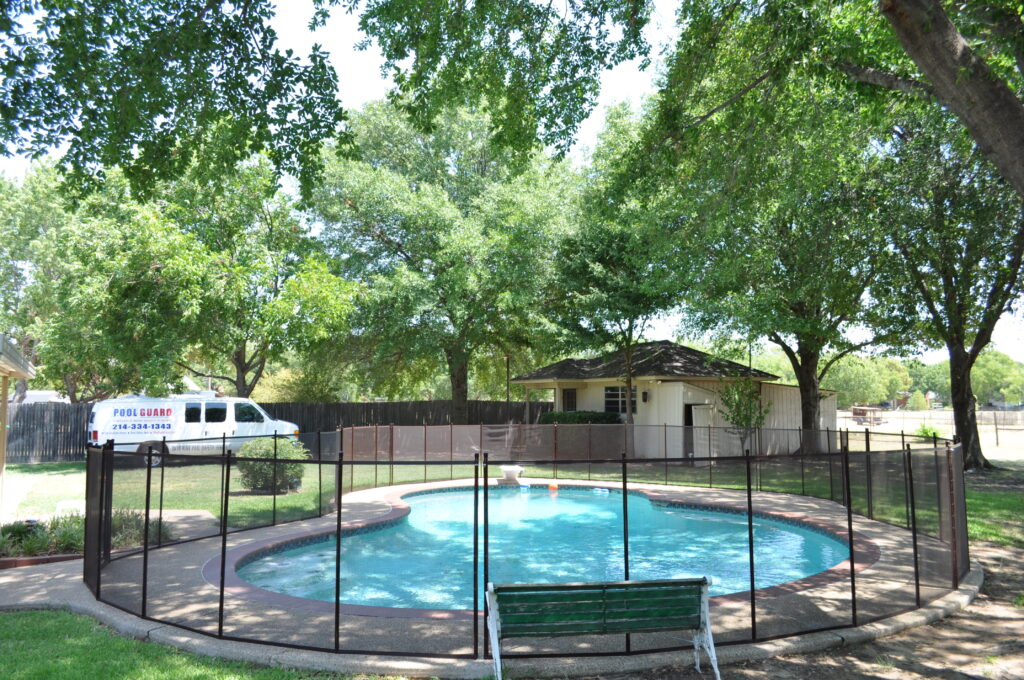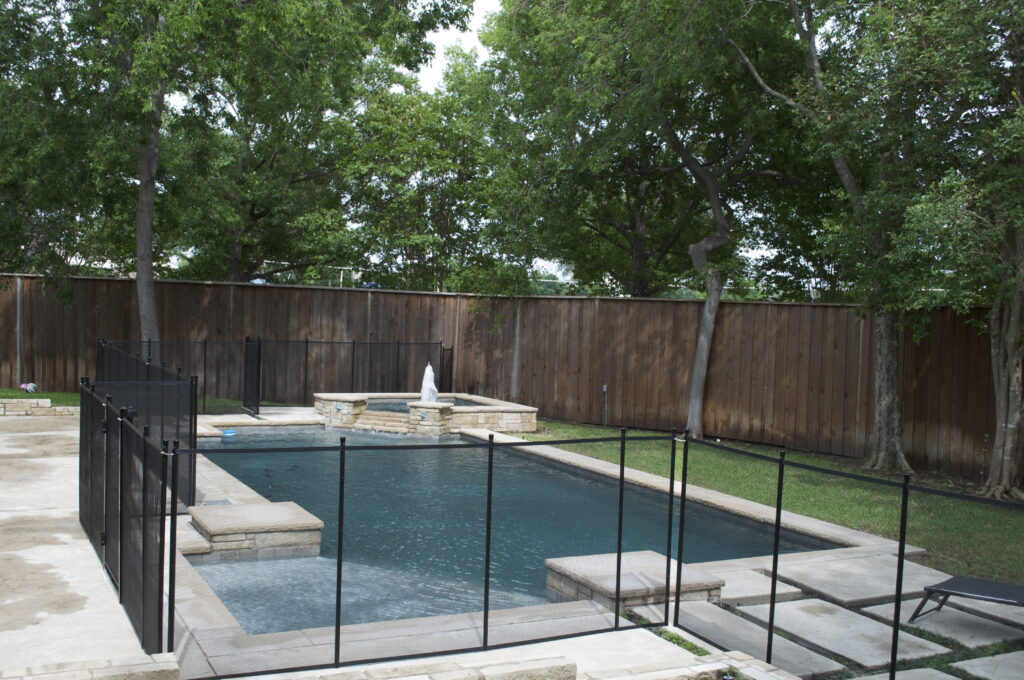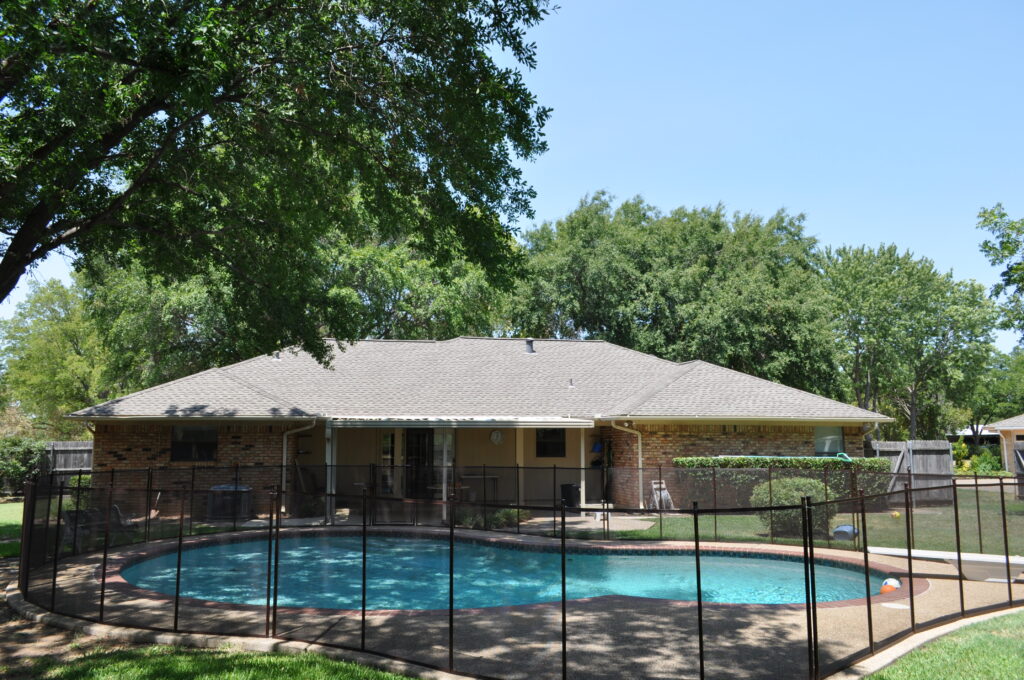Building a swimming pool in New Jersey brings excitement, but it also carries important responsibilities. Understanding pool code fence requirements in NJ is critical for protecting children, pets, and guests while also staying compliant with state and local regulations.
A properly installed pool fence minimizes the risk of accidents, reduces homeowner liability, and ensures peace of mind. Whether you are planning a new pool or upgrading an existing one, knowing both the New Jersey pool fence code and local ordinances is essential to safeguard your family and property.

New Jersey pool fence requirements are primarily based on the International Swimming Pool and Spa Code (ISPSC) – standards set by an international team of pool builders, designers, and operators. While the state follows and adheres to the ISPSC standards, its pool fence recommendations have been amended in the Building Subcode for New Jersey.
These regulations ensure that swimming pools, spas, and hot tubs are secured with barriers that prevent unsupervised access. Compliance with the NJ pool fence code is not optional; it is mandatory for new pool installations and existing pools undergoing significant renovations.
To meet the pool fence requirements in NJ, homeowners must adhere to the following standards:
The pool fence in NJ must be a minimum of 48 inches (4 feet) above the ground, measured from the side facing away from the pool. This height helps prevent young children and pets from climbing over the barrier.
The 48-inch minimum height requirement is not just a recommendation- it is a mandatory safety standard adopted throughout every city, county, and municipality in New Jersey. Whether you’re building a pool in Princeton, Edison, Cherry Hill, or any other town across the state, this minimum fence height remains consistent.
The gap between the bottom of the fence and the ground must not exceed 2 inches. Pool safety fence manufacturers design fences with minimal ground clearance to prevent small children, animals, or objects from slipping underneath, preserving the effectiveness of the safety barrier.
When installing a mesh pool fence, homeowners need to make sure it’s not more than 1 inch above the deck, surface, or grade. At the same time, the maximum vertical clearance from the bottom of the mesh fence and the solid surface should not be lifted more than 4 inches above grade.
Any openings or gaps within the fencing material must be small enough that a 4-inch diameter sphere cannot pass through. This rule applies to spaces between vertical posts, lattice designs, and decorative elements to prevent footholds or access points.
For a barrier composed of horizontal and vertical members, the gaps between each vertical piece must be no wider than 1¾ inches. If the fence has any decorative openings within the vertical members, those openings also cannot exceed 1¾ inches in width. The same applies if the fence is composed of diagonal members.
Gates must be self-closing and self-latching, ensuring they automatically close and latch shut after each use without needing manual assistance. The latching mechanism must be positioned at least 54 inches above the ground, keeping it out of the reach of small children. If the release mechanism is less than 54 inches from the bottom of the gate, then the release mechanism should be located on the pool side at least 3 inches below the top of the gate.
Gates must swing outward, away from the pool area, so that even if a gate were inadvertently opened, it would not provide easy entry into the pool enclosure.
Gates that are not used for pedestrian use should remain locked and closed when not in use.
If installing multiple gates, the gate openings should be no larger than ½ inches within 18 inches of the latch release mechanism.
To ensure compliance with this important safety requirement, consider using the Pool Guard™ Magna Latch device, a high-quality, magnetic safety latch that meets or exceeds the stringent pool gate standards in New Jersey.
According to Section 305.4 of the ISPSC, when a wall of a dwelling serves as part of the pool barrier, and doors or windows provide direct access to the pool or spa, one of the following must be implemented:
New Jersey has incorporated these provisions into its building codes.
Tip: While this is a statewide requirement, enforcement and any additional stipulations can vary by municipality.

While the New Jersey pool fence code provides a statewide framework for safety, many municipalities enforce stricter or more specific standards. Homeowners should always verify their town’s individual regulations before installing or modifying a pool fence to ensure full compliance.
East Brunswick follows New Jersey’s statewide pool code, but local rules add further protection. One key requirement is that gates shall be self-closing and self-latching with a latch set at a height of 4 feet above the ground and be inaccessible to children from the outside.
This local guideline ensures that even if a child attempts to access the pool area, the latch is out of easy reach, enhancing overall safety. Residents must comply with both state and municipal standards to pass inspection.
Randolph adheres to the state’s pool fence standards, but it enforces a specific rule about fence construction: fences must be built without openings, holes, or gaps larger than three inches. This is stricter than the general 4-inch sphere rule in the state code and helps prevent children from slipping through or being trapped in the fence. It’s a small but important adjustment that significantly increases safety.
Like other cities, West Orange follows the core principles of New Jersey’s pool safety laws but requires all residential swimming pools to be enclosed by a permanent fence made of durable material that stands at least 4½ feet high. This height slightly exceeds the state’s minimum of 4 feet, reflecting the township’s extra caution in residential pool safety. It’s likely designed to protect children from the risk of drowning, as 1-4 4-year-olds are more likely to drown in a pool. Homeowners in West Orange should ensure their fence plans meet this higher local standard before installation.
While Toms River applies New Jersey’s statewide pool fence laws, it introduces an important local zoning rule: fences must be placed at least 6 feet away from the water’s edge. This distance requirement creates a larger safety buffer between the pool and the fence, giving more time to intervene if someone breaches the barrier. It’s a zoning-based layer of safety that is unique to Toms River.
West Cape May complies with New Jersey’s pool safety code but adds a local restriction on fence height: pool fences must be at least 4 feet tall but no more than 6 feet high. This range ensures adequate protection without allowing overly tall fences that may conflict with local zoning or design standards. It’s a reminder that even when following state rules, municipal ordinances may add height caps or aesthetic requirements.
Installing a compliant pool fence in New Jersey is essential for protecting children, reducing homeowner liability, and securing the required certificate of occupancy (CO) for your pool. Many homeowners’ insurance policies also require pool barriers to maintain coverage.
To stay fully compliant, always verify local regulations with your township, work with licensed pool safety installers, use ASTM-compliant fences or ICC-certified products, and schedule regular inspections to ensure your fence meets all safety standards.
Temporary pool fences can meet New Jersey’s pool fence requirements if they are installed correctly and meet the standards for height, clearance, and strength. These fences must be at least 48 inches high and securely anchored to prevent children or pets from bypassing the barrier. However, homeowners should verify with their local building department whether the temporary fence complies with both state and municipal regulations to ensure full compliance.
In New Jersey, the pool fence must be installed before the pool is filled with water. You must have the fence in place and ready for inspection before your pool is considered operational. This ensures that the pool area is properly secured and meets statewide and local safety codes. Failing to install the fence first can delay the process and potentially result in fines or the need to re-install the fence later.
Yes, rental properties with swimming pools must comply with the same pool fence requirements in NJ as owner-occupied homes. However, landlords may face additional liability insurance requirements and must ensure tenants are aware of pool safety measures. In some towns, rental properties might need to meet extra local regulations, such as additional barriers or alarm systems on doors leading to the pool. Always check with your local building department to confirm rental-specific safety standards.

Properly installing a fence that adheres to both statewide and local pool code fence requirements in NJ reduces the likelihood of accidents and helps ensure that your pool is a safe environment for children and pets. Non-compliance can lead to costly delays, penalties, and legal liabilities, especially if an accident were to occur.
That’s why partnering with a licensed pool fence installer in New Jersey, familiar with all the statewide and local codes, can save you time, prevent costly mistakes, and ensure full compliance.
Please fill out the form below with your information. Your local dealer will be notified about your inquiry.
Please fill out the form below with your information. Your local dealer will be notified about your inquiry.